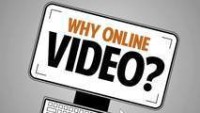 Businesses today rely on a number of things to help them to advertise their products or services. With real estate, it is all about location. With online businesses, it is all about visibility. In order to engage your website visitors and keep them coming back, you have to give them something that intrigues them. Online video is an excellent way to impress website visitors and keep them coming back for more.
Businesses today rely on a number of things to help them to advertise their products or services. With real estate, it is all about location. With online businesses, it is all about visibility. In order to engage your website visitors and keep them coming back, you have to give them something that intrigues them. Online video is an excellent way to impress website visitors and keep them coming back for more.Following is a list of 5 ways that online video can help you to increase your business.




 You don’t need expensive video editing software to tell your story, as Jonathan Wylie of PC World, points out in his recent article,
You don’t need expensive video editing software to tell your story, as Jonathan Wylie of PC World, points out in his recent article, 